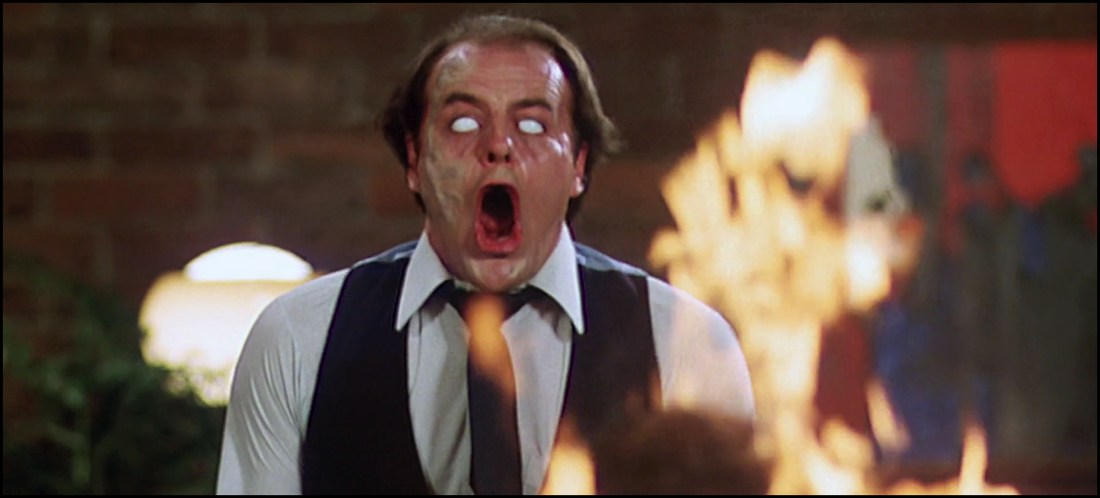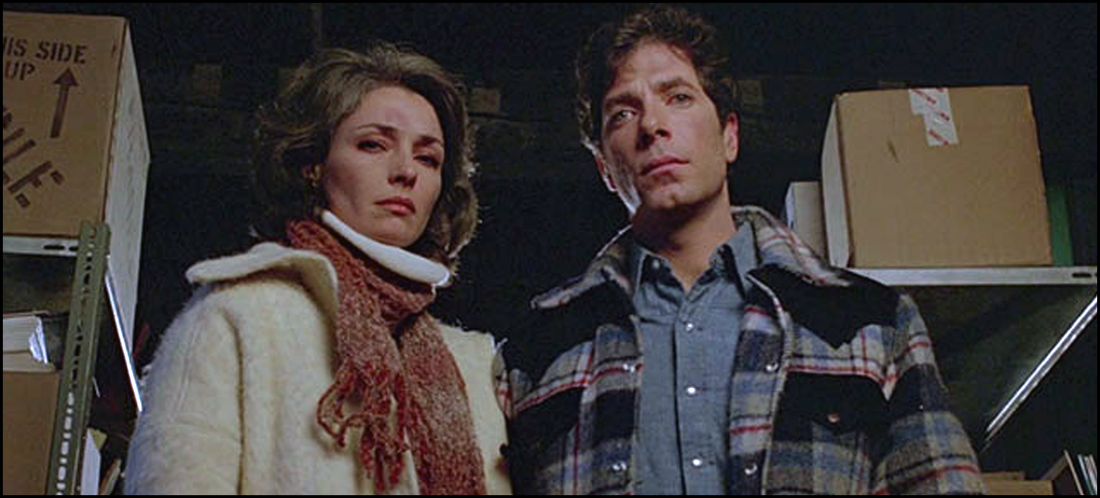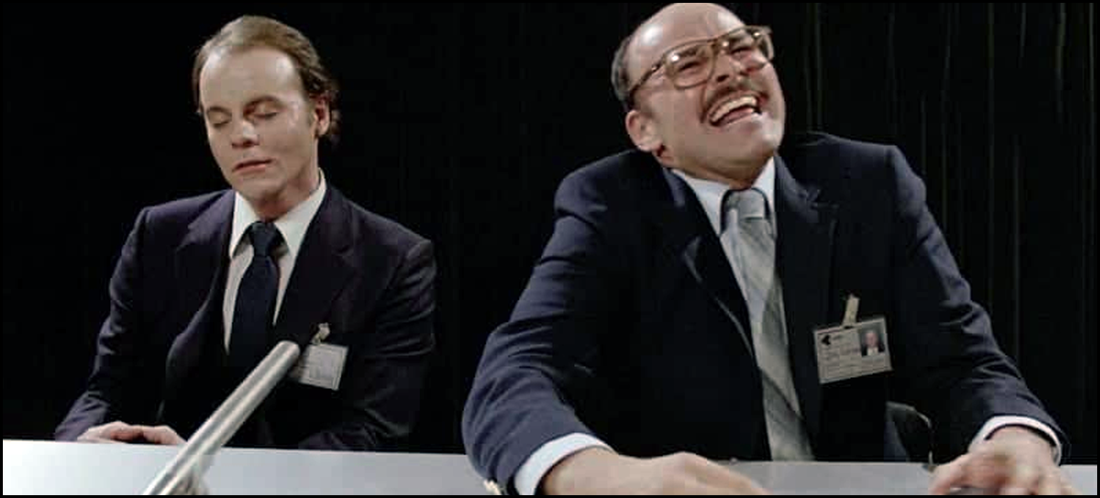From the film’s IMDB.com citation:
“A scientist trains a man with an advanced telepathic ability called ‘scanning,’ to stop a dangerous Scanner with extraordinary psychic powers from waging war against non scanners.”
Honestly, I’ve had this love/hate thing with director David Cronenberg his entire career. (Don't worry, Dave: it's me, not you.) In short, I’ve never much cared for his original works.
While they’ve occasionally had some inspired ideas, I just haven’t been all that smitten with anything beyond the look and, sometimes, the practical effects work that’s matched his various visions. Some of it I find just plain confusing – Videodrome (1983) started out as a unique Horror procedural but then morphed into an experimental piece with some macabre visuals – while others I ended up being bored silly over – Dead Ringers (1988) was a particular snooze. I will say I’ve enjoyed his adaptations of other peoples’ idea better than extrapolations of his own – he directed the earliest version of Stephen King’s The Dead Zone (1983) which I’d argue is still the best King book-turned-film as well as a heart-wrenching incarnation of The Fly (1986) – but otherwise I guess I’d conclude by suggesting his original stuff just hasn’t been for me.
1981’s Scanners is a film that, arguably, put Cronenberg on the entertainment map.
It was both written and produced very quickly in late 1979 (1978?) in order to take advantage of some Canadian tax benefits; and – from what I’ve read – it was a bit of a chaotic shoot, often times with the writer/director crafting scenes quite literally the morning before they were shot. As a consequence, the narrative was naturally tweaked a bit – not unheard of in the creative process – and the end result is a tale that feels part like it was a Horror-inspired yarn that somehow turned the corner into a government conspiracy potboiler. Sadly, the elements of the mystery – there either is or isn’t a global cabal behind scanners and, depending upon one’s interpretation, they either seek to harness their power or wipe them out – end up being exposed in information dumps delivered more like afterthoughts than anything intended originally.
Though he’s positioned as little more than a vagrant in the story’s opening moments, we eventually learn that he’s lead the life of a transient somewhat by design: Scanners have been monitored for years, though exactly how and why this has been done is kept concealed until later in the picture. He, in particular, has been kept 'in the shadows' and disallowed to live a normal life. We watch in this set-up as he uses his powers against those who would judge him, and it’s easy to identify with his struggle to just make ends meet, even if that means pilfering a leftover sandwich from an abandoned lunch tray. Under his stewardship, Vale is likeable and relatable, so his evolution from wayward lost soul to the film’s potential hero works.
As his nemesis, genre great Michael Ironside (as Darryl Revok) has likely forgotten more about chewing scenery than most actors ever learn, much less master.
Though the actor hasn’t always played ‘the heavy,’ I can say with conviction that, when he has, he’s remembered for it. (Hell, he might even be revered for it.) Genre fans have enjoyed his abilities in such projects as television's V, Spacehunter: Adventures In The Forbidden Zone (1983), Total Recall (1990), and Terminator Salvation (2009). His IMDB.com profile is fast approaching 300 different screen roles. He’s that rare talent who inhabits those dark elements and brings them to the surface with practiced ease. His early scenes here are laced with an undercurrent of evil; we see him watching developments from afar and, in some cases, tinkering in these events, all seemingly intent on capturing Vale before … before … well … before …
Therein lies the crux of my problem with Scanners: it holds far too many of its secrets back until its last reel when Revok and Vale’s true identities are finally revealed, as is the role others have played in this grand Machiavellian drama. The imperfect structure of this plot – the who’s, the what’s, the why’s – end up being reserved to the point wherein the audience can’t truly appreciate the earlier drama except to conclude that it’s all well-done, well-captured, and well-intended. Having the logic to understand some of these characters’ motivation earlier would likely have bridged the gap otherwise created here, and I can’t help but wonder if this was a consequence of not having a completed script before all was said and done. The true cores of characters played by Jennifer O’Neill and Patrick McGoohan end up feeling lost in the shuffle to craft a narrative in progress, and even the late McGoohan is on record as not knowing what this was all about while it was in production. Dare I say, it shows?
Setting those quibbles aside, Scanners feels more and more about a few impressive action and effects sequences than it does the investigation of its proposed dark cabal and their nefarious eugenics. Lack and Ironside make for great polar opposites in this world of evil and (maybe) good (maybe just lesser evil), but this particular story only gave them a single big scene together … and I would’ve loved more.
The flick is understandably revered for its showdown and – even more so – its incredible head-exploding sequence; the director employed some of the best effects people of the era to get those scenes ‘in the can,’ and it shows. (Industry legend Dick Smith essentially pioneered a whole new bladder system for this film and others, and the genius of putting it on display here shows.) But all of the whizzes, booms, and bangs without greater narrative context (or emotional resonance) genuinely robs these characters of the requisite impact, leaving Scanners a bit listless … and some of us with headaches all of our own.
Lastly, I’d be remiss in my duties if I failed to point out that Scanners is not without its ardent supporters. It started a franchise – I believe there were two sequels, though I’ve not read anything all that complementary about their quality – and something indeed needs to be said for that. Also, I know I’ve read about a potential reboot not once but twice (even a television version has been talked about, I believe); and I’d heartily encourage someone to dust off the property and give audiences another go-round. There’s potential for more journeys into this universe; I just hope the next visit doesn’t go up like a skull under mental manipulation!
Scanners (1981) was produced by Canadian Film Development Corporation and a few other participants. DVD distribution (for this particular release) was coordinated by the reliable Criterion Company. As for the technical specifications? Well, you’ll believe a head can explode! The sights and sounds are fabulous from start-to-finish. As for the special features? This 2018 release offered up a new restored 2K transfer supervised by Cronenberg himself, and it certainly looks fabulous. While short a commentary track (gasp!), there are a few other items worth your time, including:
- The Scanners Way – a documentary examining the film’s special effects;
- Mental Saboteur – an interview with Ironside;
- The Ephemoral Diaries – A 2012 interview with Lack;
- The Bob Mclean Show – a brief interview with Cronenberg;
- And a few additional niceties. It’s a great collection fans will appreciate.
Recommended. While imperfect and not always entirely rational, Scanners is still recommended viewing, especially for students of the 1980’s, horror aficionados, and (definitely) Cronenberg purists. I’m hardly the auteur’s biggest fan – just hasn’t struck a chord with me as he has so many others – but the film kept my interest; and – when it was over – I wished a bit more time had been spent with story as opposed to spectacle. Rewatchability is good … but I’ll bet whoever picks this one up for a reboot will bring more depth to its mystery.
-- EZ




 RSS Feed
RSS Feed